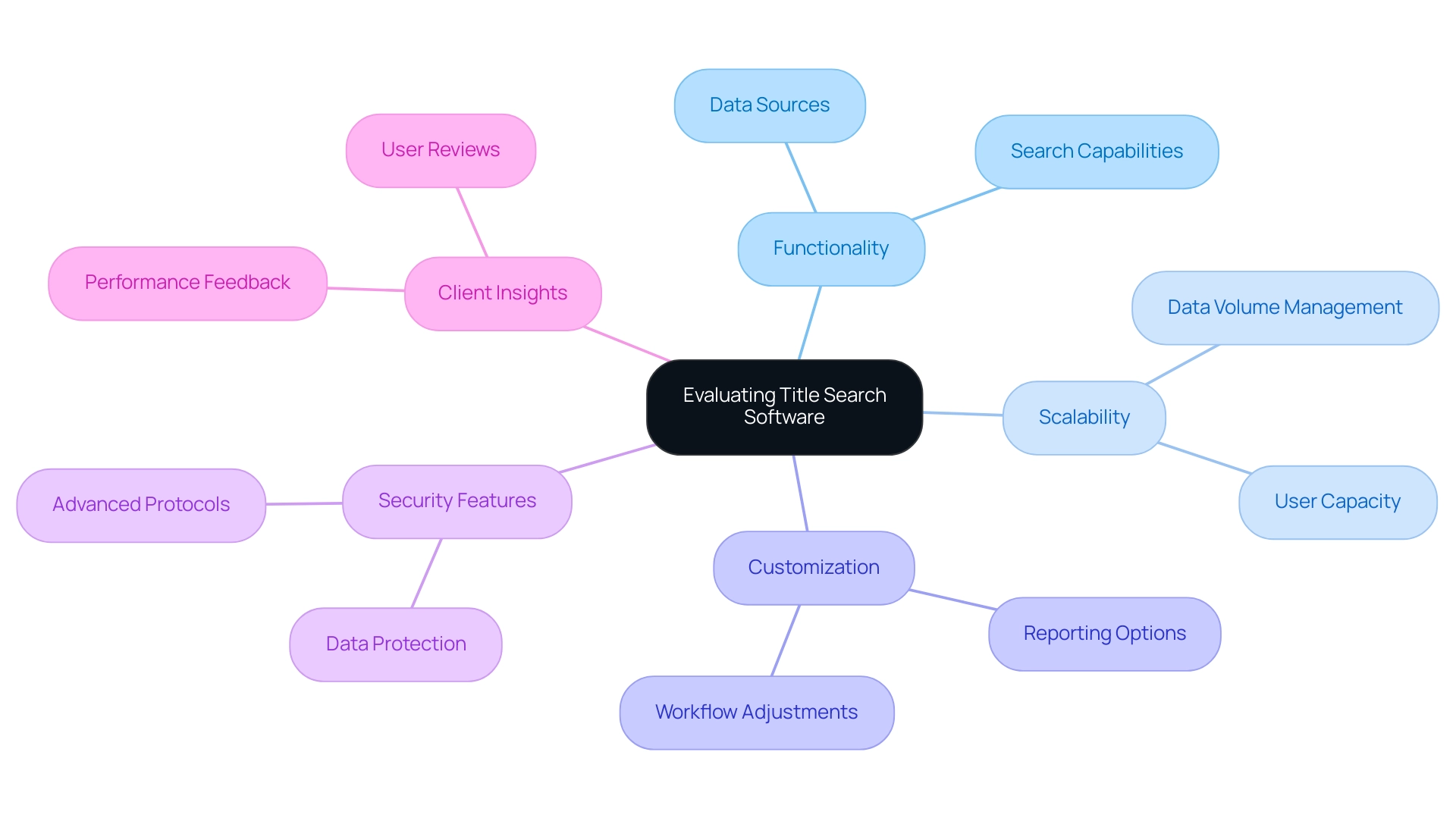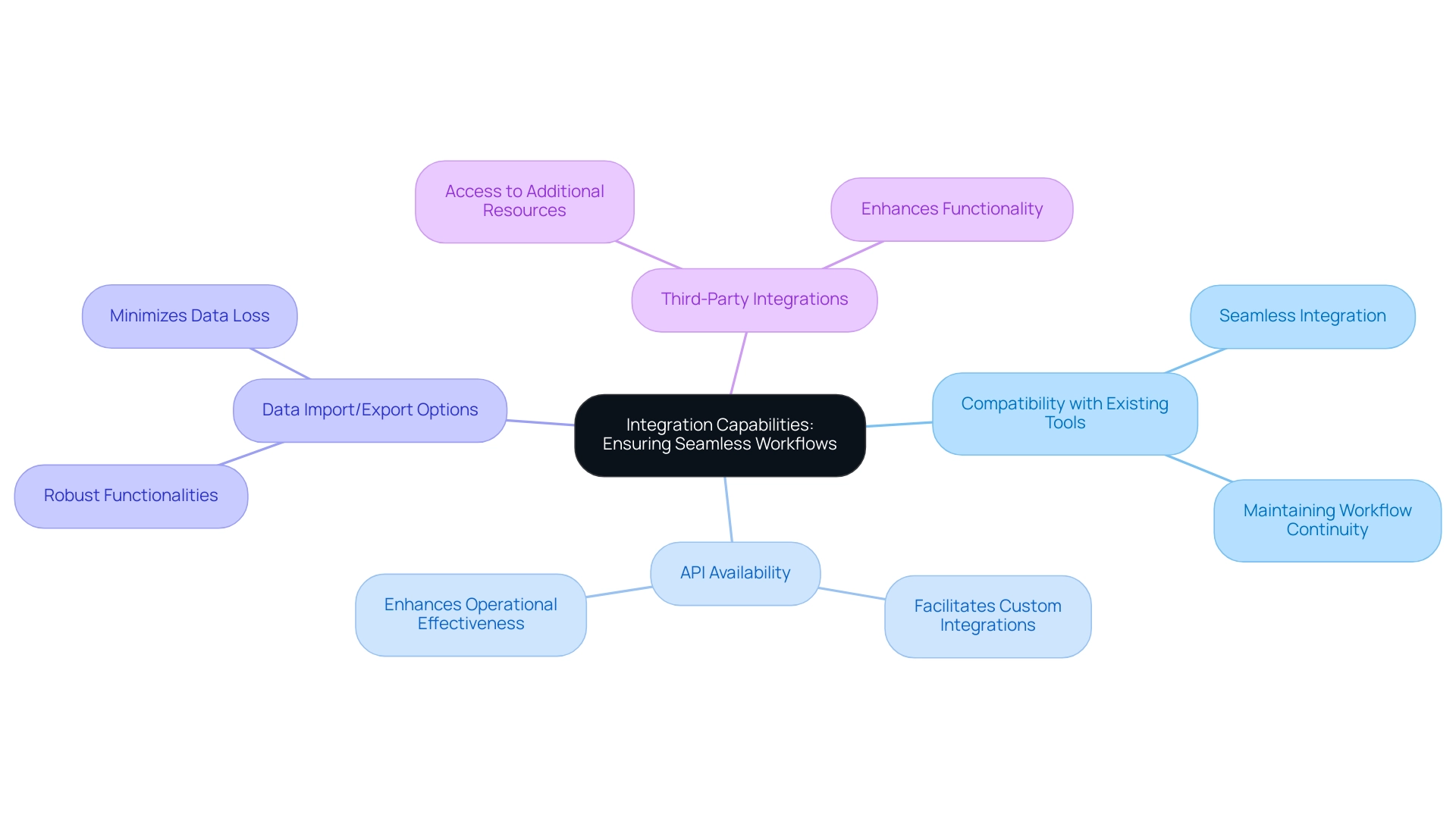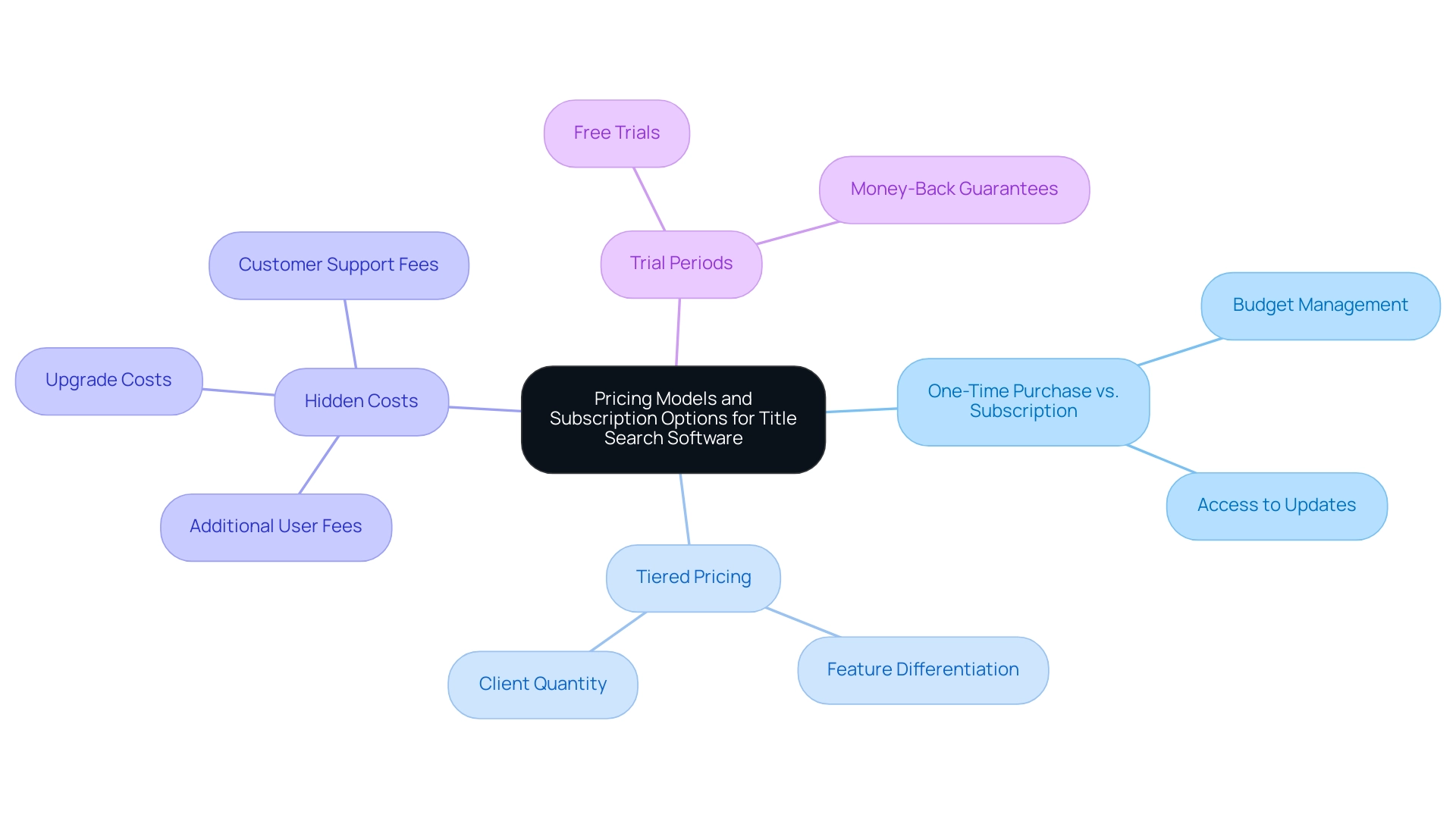Overview
To choose the best title search software, it is essential to evaluate key features such as search capabilities, document management, reporting tools, compliance checks, and user experience. The article emphasizes that prioritizing these criteria ensures improved operational efficiency and accuracy in property inquiries, ultimately facilitating smoother real estate transactions.
Introduction
In the realm of title research, the selection of appropriate software can significantly influence the efficiency and accuracy of operations. As real estate transactions become increasingly complex, understanding the core features of title search software is paramount for professionals in the field. This article delves into essential criteria for evaluating software solutions, emphasizing the importance of:
- Functionality
- Scalability
- User experience
By prioritizing integration capabilities and comprehending pricing models, title researchers can make informed decisions that not only streamline workflows but also enhance compliance and protect against potential legal issues. The insights provided here serve as a comprehensive guide for those seeking to navigate the evolving landscape of title search technology effectively.
Understanding the Core Features of Title Search Software
When choosing document examination applications, it is crucial to assess the following fundamental characteristics that greatly improve efficiency and precision in document examinations:
- Search Capabilities: Opt for title search software that offers , enabling users to filter results based on various criteria, including property type, location, and ownership history. This functionality is crucial for identifying potential issues quickly, especially in the context of dry closings where clear ownership is vital to avoid legal disputes.
- Document Management: Efficient document administration is essential; ensure the title search software can skillfully manage, arrange, and access document titles. Features such as document uploading, annotation, and streamlined retrieval processes are key in managing large volumes of information, which is essential for maintaining clarity and protecting against fraud.
- Reporting Tools: The ability to generate customizable reports is paramount. The software should enable users to create detailed documentation reports swiftly, facilitating smoother communication with stakeholders involved in real estate transactions. This is especially important considering the current focus on ensuring clear labels in the real estate market.
- Compliance Checks: Incorporating compliance verification tools is necessary to ensure adherence to legal standards and requirements. This feature safeguards against possible legal concerns that may emerge during the closing process, making it an essential element of any title search software for ownership verification.
- User-Friendly Interface: A straightforward and intuitive interface is crucial for efficient navigation. As Khyati Hooda, an SEO specialist, points out, 'the underlying themes of quality content and experience will always remain important.' A well-crafted user experience enhances workflow efficiency, enabling researchers to concentrate on essential tasks without superfluous complications.
By comprehending and prioritizing these fundamental features, researchers can make informed decisions that directly improve their operational efficiency and the precision of their inquiries, ensuring a smoother closing process and safeguarding the interests of all parties involved.
Evaluating Title Search Software: Key Criteria to Consider
When evaluating title search software, it is crucial to consider to ensure the selection aligns with your title research processes and business needs:
- Functionality: Assess if the program includes all vital features required for your title research activities. Effective applications should integrate comprehensive data sources and advanced search capabilities, allowing for thorough and efficient investigations. As highlighted in the case study "Features to Look for in Title Search Software," focusing on these features can significantly enhance efficiency and effectiveness in property research.
- Scalability: It's important to evaluate if the system can adapt to your business's growth. This includes its ability to manage increasing volumes of data and accommodate a growing number of users without compromising performance.
- Customization: Choose tools that provide customization options to tailor workflows and reporting requirements specific to your operations. A user-friendly interface that allows for adjustments can significantly enhance usability and efficiency.
- Security Features: Robust security measures are paramount. Ensure that the application implements advanced security protocols to protect sensitive title information from unauthorized access and potential breaches.
- Client Insights: Conduct thorough research on reviews and testimonials to assess the program’s reliability and effectiveness in practical applications. Insights from current users can provide valuable information regarding the application's performance and support services.
By carefully applying these criteria, researchers can choose technological solutions that not only enhance operational efficiency but also improve precision in property inquiries, ultimately supporting better decision-making in real estate transactions. As Mary F. Rupp stated, "Choosing the right tools is essential for enhancing the quality of research and ensuring compliance with industry standards.

The Importance of User Experience and Support in Title Search Software
When selecting , it is crucial to prioritize experience and assistance. Consider the following key factors:
-
Intuitive Design: An interface that is easy to use minimizes the learning curve and enhances productivity, allowing individuals to focus on their research tasks rather than navigating complex functionalities.
Thoughtful UX design can lead to a 2x increase in productivity among teams managing transitions, underscoring the importance of an intuitive interface.
-
Training Resources: Assess if the service provider supplies extensive training materials, such as tutorials and webinars, which can greatly accelerate individuals' proficiency in using the application efficiently.
Customer Support: Access to reliable customer support is crucial for resolving issues swiftly.
Seek providers that offer multiple support channels, such as phone, email, and live chat, to ensure timely assistance.
As 60% of organizations are projected to harness AI to drive audience engagement by 2025, the relevance of strong customer support will only grow.
-
Community Forums: Certain application providers cultivate participant communities that enable the sharing of tips and solutions, creating a collaborative atmosphere that improves participant support.
Additionally, consider the effect of experience on research outcomes. For instance, a study found that a 0.1-second improvement in site speed can significantly enhance sales metrics, with retail consumers experiencing an 8.4% increase in conversions.
By emphasizing user experience and strong support systems, researchers can equip themselves with the necessary tools to maximize the effectiveness of their applications, ultimately leading to enhanced research outcomes.
Integration Capabilities: Ensuring Seamless Workflows
When evaluating integration capabilities in title search software, it is essential to consider the following factors:
- Compatibility with Existing Tools: Confirm that the title search application can seamlessly integrate with your current tools, such as accounting programs, CRM systems, or . This compatibility is crucial for maintaining workflow continuity.
- API Availability: Assess whether the program provides an Application Programming Interface (API), which facilitates custom integrations and allows for efficient data sharing between applications. The availability of APIs is increasingly recognized as a vital component in enhancing operational effectiveness.
- Data Import/Export Options: Seek out applications that offer robust data import and export functionalities. This capability enables smooth transitions between systems and minimizes the risk of data loss during transfers, ensuring that vital information remains accessible.
- Third-Party Integrations: Investigate the extent to which the software supports third-party integrations. These can significantly enhance functionality, providing access to additional resources such as mapping tools or legal research databases that complement property research efforts.
By prioritizing strong integration capabilities, researchers can develop workflows that significantly enhance both efficiency and accuracy through title search software, ultimately leading to more streamlined processes. For instance, firms compile a detailed document, frequently referred to as a report, which lists any judgments, liens, or other issues associated with the property. AccuTitle, which serves over 2,000 professionals across 39 states, showcases the effectiveness of leveraging advanced integration features within their RealTech platforms.
As Bill Bartzak, CEO of AccuTitle, states, "We at AccuTitle are excited to expand our integration with First American Title by bringing together three legacy relationships under one roof. These integrations are essential for our clients to access their property and settlement providers with ease and streamline their workflow. Furthermore, automation substitutes the manual verification of physical documents, enabling programs to manage the task of searching through paper files, resulting in enhanced efficiency and quicker access to crucial information through data aggregation.

Understanding Pricing Models and Subscription Options for Title Search Software
When evaluating pricing models and subscription options for title search software, it is essential to consider several critical factors:
- One-Time Purchase vs. Subscription: Evaluate if the application is available as a one-time purchase or through a subscription model. Each option has distinct implications for budget management and frequency of use. Subscription models are increasingly popular due to their flexibility and access to ongoing updates, which can be crucial in an industry where information is constantly evolving.
- Tiered Pricing: Numerous application providers implement tiered pricing models that differ according to the features offered or the quantity of clients. By analyzing which tier aligns best with your specific needs, you can ensure you are receiving optimal value while avoiding unnecessary expenditures.
- Hidden Costs: It is vital to remain vigilant about potential hidden costs. These may include fees for additional users, required upgrades, or customer support services that could increase the overall cost of the program.
- Trial Periods: Seek out applications that offer free trials or money-back guarantees. This enables you to assess the system’s effectiveness and suitability for your operations before making a financial commitment.
Understanding these pricing models and subscription options is crucial for researchers of works. It enables informed decision-making that aligns with financial objectives, ultimately facilitating a smoother transaction process in real estate. With the document examination procedure usually requiring anywhere from a few days to multiple weeks, selecting the appropriate program can greatly improve efficiency and precision.
Moreover, advancements in title search software have streamlined the research process by aggregating vital information from various sources, providing quicker access to necessary details and improving overall productivity. As Cody Slingerland, , emphasizes, "Collaborating with subject matter experts is essential to create valuable insights on pricing strategies that cater to unique business needs.” This underscores the importance of understanding the unique characteristics of SaaS businesses and the necessity for tailored pricing strategies.

Conclusion
Selecting the right title search software is a critical investment that can greatly enhance the efficiency and accuracy of title research operations. By focusing on core features such as:
- Advanced search capabilities
- Effective document management
- Robust reporting tools
Title researchers can streamline their processes and mitigate potential legal risks. Additionally, ensuring compliance checks and a user-friendly interface plays a vital role in maintaining operational integrity and user satisfaction.
Evaluating software through key criteria like:
- Functionality
- Scalability
- Customization
further empowers professionals to choose solutions that align with their unique business needs. The significance of strong security measures and user feedback cannot be overstated, as they safeguard sensitive information and inform decisions based on real-world performance.
Moreover, prioritizing user experience and support, including:
- Intuitive design
- Comprehensive training resources
fosters an environment where title researchers can thrive. Integration capabilities with existing tools and APIs enhance workflow continuity and operational effectiveness, while a clear understanding of pricing models ensures that financial considerations align with business objectives.
In conclusion, the evolving landscape of title search technology demands careful consideration and strategic decision-making. By implementing the insights outlined in this article, title researchers can navigate the complexities of software selection with confidence, ultimately leading to improved accuracy, efficiency, and compliance in their operations. Investing in the right tools is not just about keeping pace with industry standards; it is about positioning oneself for success in an ever-changing real estate environment.
Frequently Asked Questions
What are the key characteristics to consider when choosing document examination applications?
The key characteristics include search capabilities, document management, reporting tools, compliance checks, and a user-friendly interface.
Why are advanced search capabilities important in title search software?
Advanced search capabilities allow users to filter results based on various criteria, which is crucial for quickly identifying potential issues, especially in dry closings where clear ownership is essential to avoid legal disputes.
How does document management impact the efficiency of title search software?
Efficient document management ensures that the software can skillfully manage, organize, and access document titles, which is vital for handling large volumes of information and protecting against fraud.
What role do reporting tools play in title search software?
Reporting tools enable users to generate customizable reports quickly, facilitating smoother communication with stakeholders involved in real estate transactions.
Why are compliance checks necessary in title search software?
Compliance checks are necessary to ensure adherence to legal standards and requirements, safeguarding against potential legal issues that may arise during the closing process.
What is the importance of a user-friendly interface in document examination applications?
A user-friendly interface enhances navigation and workflow efficiency, allowing researchers to focus on essential tasks without unnecessary complications.
What additional criteria should be considered when evaluating title search software?
Additional criteria include functionality, scalability, customization options, security features, and client insights from reviews and testimonials.
How does scalability affect the choice of title search software?
Scalability ensures that the software can adapt to a business’s growth, managing increasing data volumes and accommodating more users without compromising performance.
Why is security a critical feature in title search software?
Robust security measures are essential to protect sensitive title information from unauthorized access and potential breaches.
How can client insights influence the selection of title search software?
Client insights from reviews and testimonials provide valuable information regarding the software's reliability and effectiveness in practical applications.




